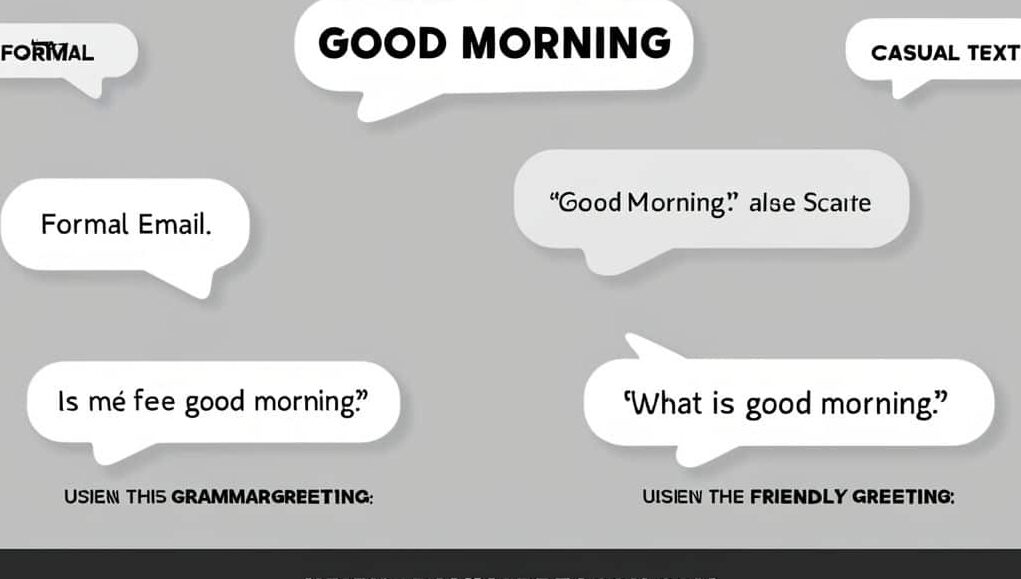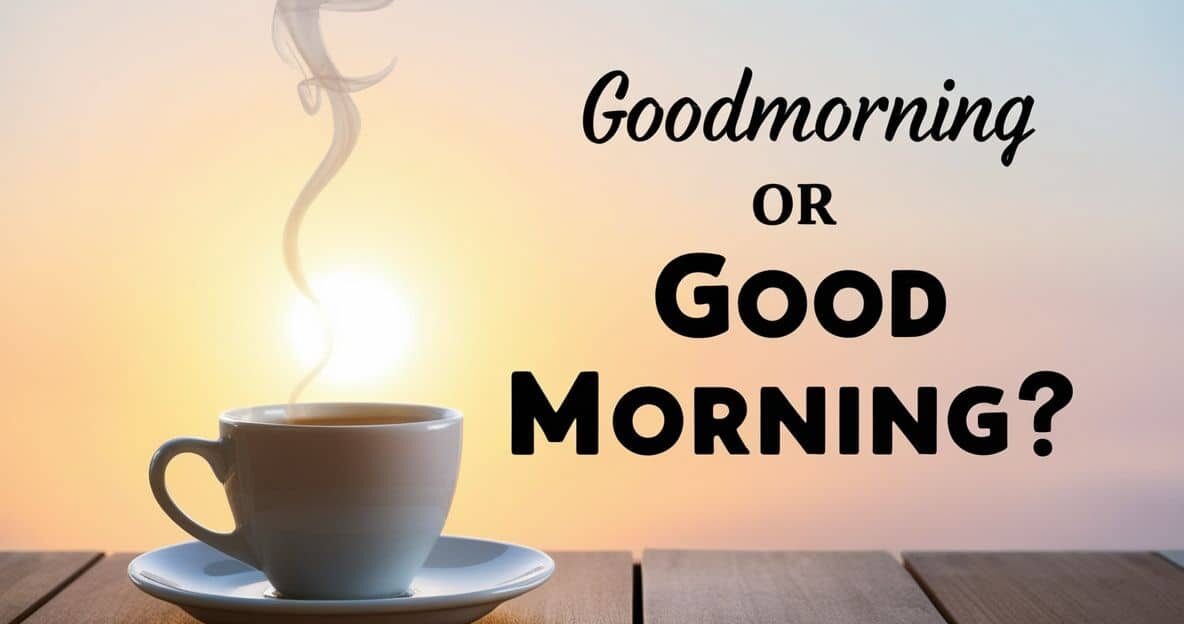Wondering about the correct way to greet someone in the morning? The confusion between “Goodmorning” or “Good Morning” pops up more often than you’d think. Whether you’re sending a quick text or writing a formal email, knowing the correct spelling of good morning is key to making a good impression. This article clears up the mystery and explains the good morning meaning, along with tips on how to use this classic morning greeting properly.
Morning salutations set the tone for your entire day. Using the right morning phrases especially in professional communication helps you sound polished and thoughtful. Stick around to learn about common mistakes, pronunciation tips, and some creative good morning alternatives that brighten up any conversation.
Quick Answer ‘Goodmorning’ or ‘Good Morning’?
The correct spelling is “good morning” always two words. The form “goodmorning” is a grammar mistake that doesn’t appear in any standard dictionary.
You might see goodmorning floating around in casual texts or on social media, but it’s not proper English. When in doubt, always use the spaced version.
Why Is It ‘Good Morning’ and Not ‘Goodmorning’?
The phrase “good morning” is made of an adjective (good) and a noun (morning). In English, greetings like these are typically not written as compound words. That’s why we write it as two separate words, just like we say “good evening” or “good night.”
Scenario example: ✉️ You’re writing a business email: ✅ “Good morning, Mr. Lee. I hope this message finds you well.” ❌ “Goodmorning, Mr. Lee. I hope this message finds you well.”
Tip to remember: If you wouldn’t say “goodevening”, don’t write goodmorning. Treat them all the same.
Also Read: Cancellation vs Cancelation: Which Spelling is Correct?
Good Morning Meaning and Usage
“Good morning” is a polite, friendly way to greet someone before noon. It’s an exclamatory phrase or a morning salutation that sets a positive tone.
Use it when:
- Starting a conversation
- Writing a formal or informal morning email greeting
- Greeting someone in-person in the morning
Synonyms for good morning:
- Morning!
- Hello sunshine!
- Rise and shine!
- Up and at ’em!
- Good day to you!
Good Morning in a Sentence Real Examples

Here are some ways “good morning” is used across different settings:
| Context | Example Sentence |
| Formal | Good morning, Ms. Taylor. I’m writing to confirm our ten a.m. meeting. |
| Casual | Good morning! Hope you had a great weekend. |
| Friendly | Hey, good morning sunshine! Ready for coffee? |
| Text Message | Just wanted to say good morning and have a great day! |
Pro tip: For professional greetings, always capitalize both words and use proper punctuation.
Pronunciation How to Pronounce ‘Good Morning’
Though we write good morning as two words, in speech, they often blend together. This leads many to wrongly assume it’s one word.
- Phonetic pronunciation: /ɡʊd ˈmɔːrnɪŋ/
- Say it slowly to feel the word break: “Good… Morning”
Tip to avoid confusion: When writing, say the words aloud. If you can hear a pause, there’s likely a space in spelling too.
Why ‘Goodmorning’ Appears So Often Online
Autocorrect, texting habits, and fast typing make people write “goodmorning” by accident. Over time, repeated use on social media has made the incorrect form seem acceptable but it’s still not standard English.
Scenario example: 📱 You’re texting a colleague: ✅ “Good morning, Jordan. Let’s meet at ten.” ❌ “Goodmorning, Jordan. Let’s meet at ten.”
How to avoid this mistake:
- Use spellcheck tools like Grammarly
- Type slower and double-check your greeting
- Set up autocorrect to flag or fix it
Alternatives to ‘Good Morning’
There are plenty of creative greetings to brighten up someone’s day:
| Phrase | Tone | Use Case |
| Morning! | Casual | Friends, coworkers |
| Hello sunshine! | Cheerful | Personal notes, texts |
| Rise and shine! | Playful | Morning motivation |
| Up and at ’em! | Energetic | Wake-up messages |
| Greetings | Formal | Business or legal writing |
These make great synonyms for good morning, depending on your tone and audience.
How to Use ‘Good Morning’ in Emails and Messages
When it comes to professional writing tips, few things are more important than a strong opener. “Good morning” is ideal for emails sent before noon.
Examples:
- Good morning, team. Let’s kick off the day with a quick update.
- Good morning, Dr. Patel. Please see the attached report.
Tip: Use a comma after good morning when followed by a name. ✅ “Good morning, Sarah.” ❌ “Good morning Sarah”
Table Goodmorning vs Good Morning
| Feature | Goodmorning | Good Morning |
| Correct Spelling | ❌ Incorrect | ✅ Correct |
| Appears in Dictionaries | ❌ No | ✅ Yes |
| Used in Formal Writing | ❌ Never | ✅ Always |
| Grammar Accepted | ❌ Grammar mistake | ✅ Standard English |
| Professional Emails | ❌ Unprofessional | ✅ Appropriate |
| Common Spelling Mistakes | ✅ Frequently confused | ✅ Proper usage |
Tips to Remember the Correct Spelling of ‘Good Morning’
- Break it down: “Good” + “Morning” two distinct words.
- Think of other greetings like “good evening” and “good night.”
- Use writing tools or grammar checkers.
- Say it aloud: if you pause, there’s a space.
Bonus mnemonic: “If it’s before noon, greet with a space soon.”
FAQs About ‘Good Morning’
Good morning is the correct spelling. Goodmorning is not standard English.
You can, but it’s still technically incorrect even in texts.
Capitalize both words if it starts a sentence or stands alone as a greeting.
Last Look: ‘Goodmorning’ or ‘Good Morning’
In the end, the correct phrase is always “Good Morning” never “Goodmorning.” This small space makes a big difference in writing. Whether you’re sending a text, writing an email, or greeting someone in person, using the right form shows you care about your language. Remember, good morning usage matters in both casual and professional settings. So next time you wonder “Goodmorning or Good Morning,” choose the correct spelling. It’s simple, clear, and always the better choice. Keep this tip handy to avoid common mistakes and sound confident every morning.

Anna Angelina is an experienced blogger with a passion for creating engaging and creative content. Specializing in Team Names and group identity ideas, she brings fresh insights and clever suggestions to inspire readers. With a knack for wordplay and a love for collaboration, Anna helps teams, clubs, and organizations find the perfect names that resonate with their goals and values.

